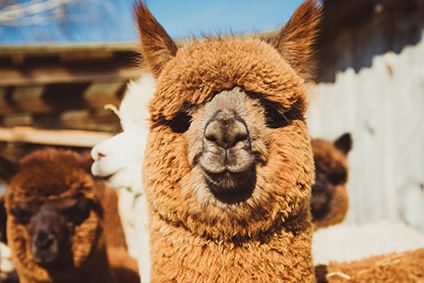
Work has begun work on a Responsible Alpaca Standard that will verify and identify alpaca fibre produced in farming systems that respect animal welfare and the environment.
The draft Responsible Alpaca Standard from Textile Exchange is aligned with its existing Responsible Wool Standard and the Responsible Mohair Standard. It is structured around the Textile Exchange Animal Welfare Framework, which sets out the principles and expectations that guide and connect Textile Exchange’s Animal Welfare Standards.
Developed with contributions from fashion retailers H&M and Gap Inc, the standard applies a “strong assurance system” to perform regular audits of the farms and to track the raw material from the farm to the final product.
Alpaca farming has a high animal welfare potential due to a husbandry system based on extensive grazing and free-ranging with animals adapted to their environment. Textile Exchange says the Responsible Alpaca Standard will be developed to ensure that this high welfare potential is realised and to provide a mechanism to verify that alpaca fibre comes from animals that have been treated responsibly and that land and biodiversity has been managed appropriately. The standard will also address social welfare at the farm.
Through production, chain of custody certification ensures that the fibre from certified farms is properly identified and tracked.
Textile Exchange adds the development of the standard will be done through an International Working Group, representing the full spectrum of interested parties, including animal welfare groups, brands, retailers, farmers, supply chain members, and industry associations.
“The industry has a responsibility for ensuring strong animal welfare throughout their supply chains and we believe that standards are an effective way to show unified demand,” says Ashley Gill, director of standards at Textile Exchange.
Una Hrnjak-Hadziahmetovic, senior manager of global sustainability at Gap Inc, adds: “In partnership with key stakeholders in Peru and around the world, this standard aims to help ensure and protect the welfare of alpacas in their natural environment in the Andes, while continuing to support the livelihoods of local communities in Peru.”
Work on the new standard comes after a PETA US alpaca wool exposé earlier this month claimed workers at Mallkini – the world’s largest privately-owned alpaca farm in Peru – were causing immense suffering to the animals as they were roughly shorn.
According to PETA, retailer Marks & Spencer responded by committing to phase out alpaca wool in all future product developments, as has Hong Kong-listed Esprit. Gap Inc and H&M Group are also understood to have cut ties with Mallkini’s parent company, the Michell Group.
However, annual shearing of the animals is necessary not only to obtain the fibre but also to prevent them from suffering from the heat and disease that excess hair would cause.
In its response, the Michell group said it had “started an exhaustive investigation” to determine the facts and to “guarantee that an event like this will never happen again.” Mallkini is the only alpaca farm in the world with Organic Certification granted by the USDA Organic and the Organic EU Regulation, which covers the soil, breeding, handling, and shearing of alpacas. It is also open to tourists, where they can watch the shearing process.
The draft Responsible Alpaca Standard is ready to pilot on farms. Findings from the pilot audits will help further develop and finalise the standard.
Interested stakeholders are invited to join the International Working Group to provide feedback during the development process.



